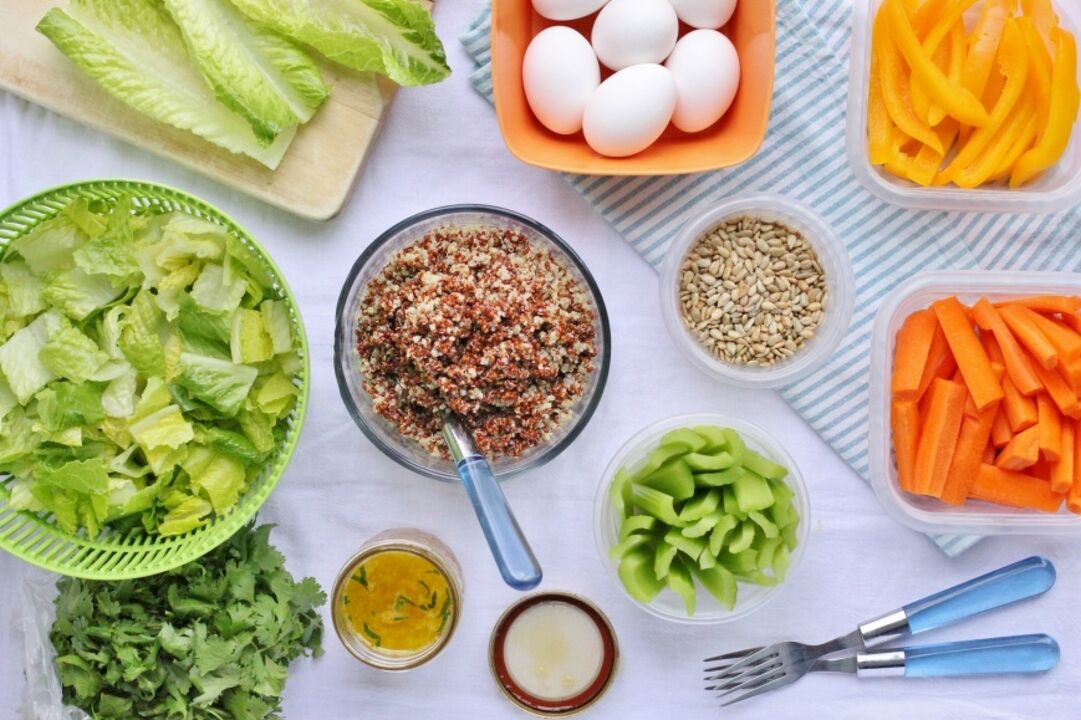
Pancreatitis is inflammation of the pancreas. Pathology occurs in acute and chronic forms. The condition has a fairly specific symptomatology: severe pain in the left hypochondrium, sometimes wearing a girdle character, foul stools, nausea and vomiting.
One of the main areas of treatment for the pathology is diet for pancreatic pancreatitis. The patient's menu depends on the general state of health and the period of the disease. It is necessary to follow medical nutrition for several months.
General principles
Nutrition for pancreatitis of the pancreas should be spared. Basics of the diet:
- fractional nutrition - food should be taken five to six times a day in small portions;
- dishes should be mashed, which facilitates the process of digesting food;
- permitted cooking methods are steaming and boiling;
- vegetables and fresh fruits are totally prohibited, that is to say not cooked;
- the permissible daily volume of salt does not exceed 5 grams;
- it is obligatory to take infusions and decoctions on rosehip berries;
- dishes served at the table should be hot - hot and cold are contraindicated;
- preservation, semi-finished products, foods and fatty / fried / very salty products are totally prohibited.
Deviation from the principles of dietary nutrition can provoke the development of an attack of pancreatitis.
Authorized and prohibited products
To reduce the production of pancreatic juice and reduce the load on the inflamed gland, it is necessary to completely exclude from the diet of the patient:
- Soups cooked in rich broths of meat, fish and mushrooms, as well as complex soups - cabbage soup, pickles, borscht. Cold and dairy products are excluded.
- Bread - baked goods made from today's wheat / rye flour, puff pastry and pastries, butter-fried pies, tortillas.
- Fatty meat - pork, lamb, duck, goose - sausages, offal, preserves and smoked meats.
- A fish. The fatty, smoked, salty varieties are prohibited.
- Products based on milk and lactic acid with a high fat content.
- Oatmeal - millet, pearl barley, wheat, corn.
- fried and hard-boiled eggs.
- Vegetables - turnip, radish, garlic, pepper, eggplant, cabbage, spinach.
- Sweets - jam, ice cream, fresh dates, grapes, bananas, figs.
- Spicy condiments.
- Coffee, strong brewed tea, coffee, soda, grape juice.
- Refractory fats - pork, beef, lamb.
When developing a menu for each day, it is necessary to take into account the recommendations of nutritionists and use only approved products. This:
- dried bread, cookies, homemade crackers;
- vegetarian soups with the addition of mashed vegetables - potatoes, zucchini, pumpkins, carrots - noodles, semolina or oatmeal;
- lean meats - chicken, rabbit, turkey - in the form of steamed chops, soufflé, dumplings, beef stroganoff;
- low-fat varieties of fish - pollock, carp, cod;
- cereals - oatmeal, semolina, rice - are used to make cereals, stews, puddings;
- skimmed milk and products based on lactic acid;
- steamed omelet without yolks;
- vegetables - potatoes, zucchini, beets, pumpkin, cauliflower, carrots, green peas;
- berries and sweet fruits in the form of mousses, jellies, puddings, baked apples;
- sauces - dairy and cooked in vegetable broth (when using flour, the latter is not sautéed);
- butter and vegetable oil;
- weak tea with lemon, still mineral water, decoction of rosehips, juice diluted with water.
Diet for acute pancreatitis
If we are talking about the type of diet recommended for the patient with an acute form of inflammation, this is the 5P treatment table. During the first two to four days, a person is recommended to be completely hungry. Only the consumption of liquid is allowed - a decoction of rosehip berries, Borjomi (without gas), weak tea. Then the patient moves on to nutritional therapy. The menu is allowed to include unsalted dishes, but high in carbohydrates.
An approximate list of dishes that can be included in the menu:
- steamed omelet on protein;
- meat soufflé;
- fish and meat balls;
- mashed soups - rice and oatmeal - and vegetarian options;
- vegetable purees;
- mashed porridge - rice, buckwheat, oatmeal;
- apples in the form of jelly or mousse;
- fruit drinks based on wild rose berries, cranberries, blackcurrant;
- tea with the addition of milk;
- cottage cheese and dishes made from it;
- cereal sausages.
Before going to bed, you can offer kefir, yogurt, a glass of water with a spoonful of honey dissolved in it, prunes and raisins.
Approximate weekly menu
When developing a menu for a week, it should be remembered that the patient's diet should be varied. When developing a menu for a patient for the whole week, you can use the following recommendations.
Breakfast can be served with a salad of boiled beets and compote of dried fruits, 150 grams of low-fat cottage cheese and a decoction of rosehip berries, a steamed omelet without yolk, weak tea with cookies, jelly from oatmeal and grated berries, pumpkin porridge, rosehip drink, cheese with cookies, rosehip broth, buckwheat porridge puree, compote.
Second breakfast: well-boiled rice porridge with steamed raisins, carrot salad in vegetable oil, apple stuffed with dried apricots and baked in the oven, pumpkin and carrot puree, boiled beets, baked applesugar.
For lunch, vegetarian soups are allowed, for example, borscht, boiled fish garnished with well-boiled rice, boiled beef, cottage cheese casserole, steamed chicken cutlet, pasta with boiled minced meat, stir-fries. Snack options: fruit jelly allowed, vegetable roll, fresh berry jelly, fruit pudding, baked potatoes, sandwiches with butter and a slice of cheese, mashed beans.
Dinner: baked apple mash and low-fat yogurt, rice porridge with raisins, kelp, dressing and yogurt, steamed cauliflower, a glass of yogurt, zucchini caviar, kefir, steamed omelet, baked fermented milk, boiled rice pudding and low fat yogurt.
By alternating dishes, you can create a "tasty" weekly menu that will provide the patient's body with all the necessary substances, but at the same time the pancreas will receive a minimum nutritional load. You can find recipes for some dishes below.
Nutrition for the combined course of pancreatitis with gastritis or cholecystitis
If the underlying disease is accompanied by the development of cholecystitis, the menu is allowed to include:
- viscous soups made from rice, oatmeal or semolina;
- mashed porridge, boiled in water, it is strictly forbidden to add milk and butter;
- vegetable juice, compotes;
- homemade white bread croutons;
- mashed boiled meat, fish;
- low-fat cottage cheese.
With a combined course of pancreatitis and gastritis, the menu should include mashed soups of oatmeal, rice and semolina, to which you can add egg yolk and a little butter, mashed vegetables- potatoes, carrots, beets - with the addition of milk or cream, steamed soufflés, cutlets, etc. minced meat and fish balls.
The strict option is recommended only during the acute period of the disease. After the condition stabilizes, the person switches to a diet recommended for chronic pancreatitis.
Features of the diet in childhood
The guiding principles of the diet for children are fragmentation, the maximum degree of grinding, compliance with the requirements of culinary processing and variety. Small portions, if served frequently, keep the child from being hungry. In this case, there is no violation of the metabolic process.

Daily calorie intake is calculated based on the weight and age of the child. At the stage of remission, the menu is allowed to include fresh vegetables and fruits (to a limited extent), but the basis of the diet is cereals with milk, minced meat dishes - chicken, turkey, vegetable soupswithout adding meat, fish - boiled or stewed, boiled vegetables, dairy products. In a small amount and daily it is allowed to give the child marshmallows, marmalade, jam, jam, honey.
Important!When introducing a new product into the diet, it is necessary to monitor the condition of the child.
Receipts
We offer you several recipes for dishes that can be prepared with diagnosed pancreatitis.
Beef pudding
Grind the boiled beef pulp (130 g) in a blender jug. Add the semolina (10 g), the beaten egg white, the yolk and a little water (about 1/3 cup) to the mash. Add a few salt crystals. Grease the mold with oil, put the prepared minced meat and cook in a double boiler.
Fish balls
Grind the lean fish (300 g) in a meat grinder. Crush a quarter of the dried bread and pour the pieces with milk (100 ml). Squeeze the bread and mix it with the minced meat, add some beaten protein. Add salt and mix well. Form small balls with two spoons and boil them in salted water until tender. It will take about 15 minutes.
Vegetable puree soup
Cook until the potatoes are completely cooked (2 pcs. ), The carrots and half a small zucchini. Drain the broth in a separate bowl and chop the vegetables until mashed using a blender. Pour the mash with the broth to the desired consistency and bring to a boil. Cook for 3 minutes. Serve hot with a dollop of sour cream in the soup.
Fish pudding
The fish carcass should be divided into two fillets. Boil the first and pass through a sieve. Grind the second part in a meat grinder. Mix the two masses, put the egg yolks, butter, salt. Knead. Divide into portion molds and steam.
Chicken soufflé
Grind the boiled chicken in a meat grinder. Add the egg yolks and butter to the minced meat. Mix well. Then gently add the whipped whites to the soft mousse. Put the mass in a mold and steam.
Banana dessert
Dissolve 2 packets of gelatin according to instructions. Add 250 ml of natural yogurt. Steam some bananas and peeled peaches. Place aluminum foil in the bottom of the plastic pan. Form the dessert in layers - cookie crumbs, gelatin yogurt cream, banana-peach puree. Alternate layers. Put the sweetness in the refrigerator to solidify the jelly.
Compliance with the principles of dietary nutrition in pancreatitis is a prerequisite for achieving persistent and long-term remission. The menu for patients with pancreatitis in adults and children, with an appropriate approach to development, can be quite varied and fully meet all the needs of the body.














































































